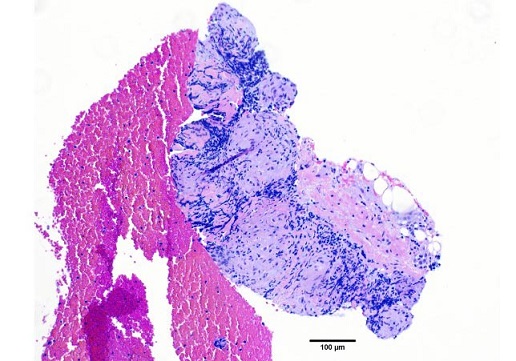Stanford case study shows that COVID-19 can lead to the new onset of Sarcoidosis
Nikhil Prasad Fact checked by:Thailand Medical News Team Aug 11, 2024 7 months, 3 weeks, 13 hours, 36 minutes ago
COVID-19 News: Researchers from Stanford University and Memorial Medical Center-USA have documented a compelling case of new-onset sarcoidosis in a patient suffering from long COVID, underscoring the potential for COVID-19 to trigger autoimmune and inflammatory conditions. This
COVID-19 News report delves into the details of this case and explores the broader implications for those enduring long COVID symptoms.
 COVID-19 can lead to the new onset of Sarcoidosis
Lymph node biopsy. Station seven lymph node biopsy. Photomicrograph of lymph node tissue displaying lymphocytes, epithelioid histiocytes, and multinucleated giant cells consistent with a non-necrotizing granuloma typical of sarcoidosis. Hematoxylin and eosin, bar = 100 μm
The Case of New-Onset Sarcoidosis
COVID-19 can lead to the new onset of Sarcoidosis
Lymph node biopsy. Station seven lymph node biopsy. Photomicrograph of lymph node tissue displaying lymphocytes, epithelioid histiocytes, and multinucleated giant cells consistent with a non-necrotizing granuloma typical of sarcoidosis. Hematoxylin and eosin, bar = 100 μm
The Case of New-Onset Sarcoidosis
In a recent case study, a 35-year-old white male, previously healthy, developed sarcoidosis following a prolonged battle with COVID-19. Initially diagnosed with mild COVID-19, the patient’s symptoms persisted beyond the acute phase, a condition commonly referred to as long COVID or Post-Acute Sequelae of SARS-CoV-2 infection (PASC). Long COVID is characterized by an array of symptoms that can last weeks or even months after the initial infection, including fatigue, brain fog, and shortness of breath.
As the patient's condition evolved, he presented with mediastinal lymphadenopathy - swollen lymph nodes in the chest - detected through imaging studies. A subsequent biopsy confirmed the presence of non-caseating granulomas, a hallmark of sarcoidosis, an inflammatory disease that can affect multiple organs, particularly the lungs and lymph nodes. This article highlights the potential for COVID-19 to trigger or exacerbate autoimmune responses, leading to conditions such as sarcoidosis.
What is Sarcoidosis?
Sarcoidosis is a multi-system inflammatory disorder characterized by the formation of non-caseating granulomas - clumps of inflammatory cells - in various organs. The exact cause of sarcoidosis remains unknown, but it is believed to involve a combination of genetic and environmental factors, including infections. Sarcoidosis can affect people of all ages and races, though it is more common in certain populations and often presents differently in men and women.
In this case, the patient’s sarcoidosis manifested in the lungs and was associated with elevated levels of angiotensin-converting enzyme (ACE), a marker often elevated in sarcoidosis patients. The condition can lead to severe complications if not properly managed, including pulmonary fibrosis, which is the scarring of lung tissue, making breathing increasingly difficult.
The Link Between COVID-19 and Autoimmune Diseases
COVID-19, caused by the SARS-CoV-2 virus, has been linked to a variety of long-term health issues, inclu
ding autoimmune diseases. The immune system's response to the virus can sometimes go awry, leading to the development of conditions where the body attacks its own tissues. This phenomenon is not entirely surprising, as viral infections have long been associated with the onset of autoimmune diseases.
In the case presented, the patient’s long COVID symptoms included persistent fatigue, body aches, and cognitive difficulties. These symptoms gradually worsened over time, culminating in the diagnosis of sarcoidosis nearly two years after his initial COVID-19 infection. The connection between COVID-19 and the onset of sarcoidosis in this patient suggests that the virus may act as a trigger for the immune system to mount an inappropriate inflammatory response, leading to granuloma formation and the development of sarcoidosis.
Broader Implications for Long COVID Patients
The findings from this case study have significant implications for the millions of people worldwide suffering from long COVID. As the medical community continues to grapple with the full impact of COVID-19, cases like this underscore the importance of monitoring long COVID patients for signs of autoimmune and inflammatory conditions.
The emergence of new-onset sarcoidosis in this patient highlights the need for healthcare providers to be vigilant in assessing long COVID patients for potential complications. This is particularly important given that sarcoidosis can be challenging to diagnose, often requiring a combination of imaging studies, laboratory tests, and biopsies.
Furthermore, the case raises questions about the long-term management of COVID-19 survivors. As more cases of post-COVID autoimmune conditions are documented, it may become necessary to develop new guidelines for the follow-up and treatment of long COVID patients to prevent the progression of such conditions.
Conclusion
This case of new-onset sarcoidosis following long COVID provides compelling evidence of the potential for COVID-19 to trigger autoimmune and inflammatory diseases. The patient’s journey from a mild COVID-19 infection to a complex diagnosis of sarcoidosis underscores the need for continued research and vigilance in the management of long COVID patients.
The study findings were published in the peer-reviewed journal: Clinical Case Reports.
https://onlinelibrary.wiley.com/doi/10.1002/ccr3.9186
For the latest
COVID-19 News, keep on logging to Thailand Medical News.
Read Also:
https://www.thailandmedical.news/news/covid-19-news-british-physicians-warn-that-sars-cov-2-infections-can-lead-to-sarcoidosis
https://www.thailandmedical.news/news/warning-individuals-undergoing-aesthetic-procedures-should-be-aware-that-microblading-and-other-beauty-regimens-can-cause-sarcoidosis
